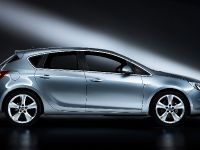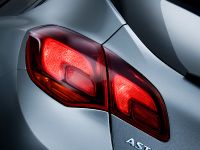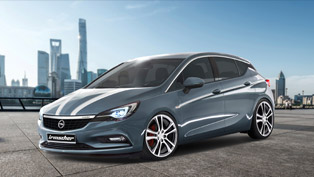2010 Opel Astra: Sporty with a Touch of Elegance
The new Opel Astra brings into the compact class its own interpretation of the brand's award-winning design language of combining sculptural artistry with German precision first seen in the Insignia. Its strong sporty lines and elegant details add to a new handsome look.
The exterior of the new generation Astra, which debuts in September at the IAA in Frankfurt, boasts a strong cab-forward, fluid silhouette. Inside, high quality materials and a total re-think of the design add to the excitement of driving a compact car. Moreover, Opel has added innovative extras – higher quality materials, more storage, improved seats and safer bumpers – to give the Astra comfort, health and safety features not usually seen in the compact class.
"The design of the new Astra takes all the best Opel has to offer and delivers it to the compact class," says Mark Adams, Vice President of Design for GM Europe. "We have built a five-door hatchback that is as beautiful as it is safe, comfortable and practical."
Exterior design gives Opel philosophy a new twist
Designers have given Opel's new philosophy an interpretation fitting for the compact class using the same wing and blade styling cues first introduced on the mid-sized Insignia. Sculpted into the side panels of the new generation Astra, the blade sweeps rear ward and upward, connecting with the side window line, giving the car balance and harmony. Eagle eye-shaped headlamps that encompass the prominent signature wing daytime running lights give the Astra face a low, sporty character.
A graceful flowing silhouette connects the muscular shoulder lines with an expressive rear to make it sporty yet elegant. On the front fascia, the next generation Astra re-interprets the new Opel face by using the small upper grille to frame the new Opel logo, while emphasizing the bigger, bolder lower opening so as to create a sportier look.
Inside, design cues used to create driver-focused styling
Echoing the flowing forms of the bodywork, the hallmarks of the interior are sweeping lines and shapes that are executed with care. Interior designers achieve that, for instance, by creating bold, dynamic shapes that use materials intelligently. Everything drivers and passengers touch has been given a refined, high quality feel. In addition, Opel has created two new progressive interior color and trim combination – Spice Red and Ocean Blue – especially for the Astra.
The interior also continues Opel's recurring wing and blade motifs. In this execution, the blade theme is expressed in details like the shape of the door grab handles and the trim for gearshift molding and steering wheel. The wing design cue is immediately evident in the warm, inviting wraparound instrument panel that embraces front seat occupants. It arcs across the cabin into the top of the door moldings.
Health, safety and comfort added via storage, seats and bumper improvements
The Opel Astra has added practicality through greatly increased storage and clever solutions for a compact class car that include a mini glove box on the driver's side and a drawer under the front passenger seat.
New, high quality seat technology brings added comfort and help to backs. In addition, safety was a major consideration in design. A new, intelligent bumper is intended to minimize damage in front and rear collisions, reducing injury to pedestrians and passengers and saving money in repairs and insurance.
Execution matched by great components and perceptual quality
Opel designers and engineers believe quality execution also must be matched by what the customer sees and feels. Such perceptual quality is particularly important in the interior, where the appearance and tactile properties of all materials must be on a par with their high standard of fit and finish.
The quality of the materials used in the new Astra is evident in such things as the grained, soft-touch surfaces, the textured panels, the quality of the décor, the chrome trim elements, and the feel of operating buttons and switches.
Quality in execution, quality in the materials used and quality as perceived by the customer add up to the new Astra's upscale appearance. Together they deliver the sculptural artistry and German precision of Opel's new design language.














